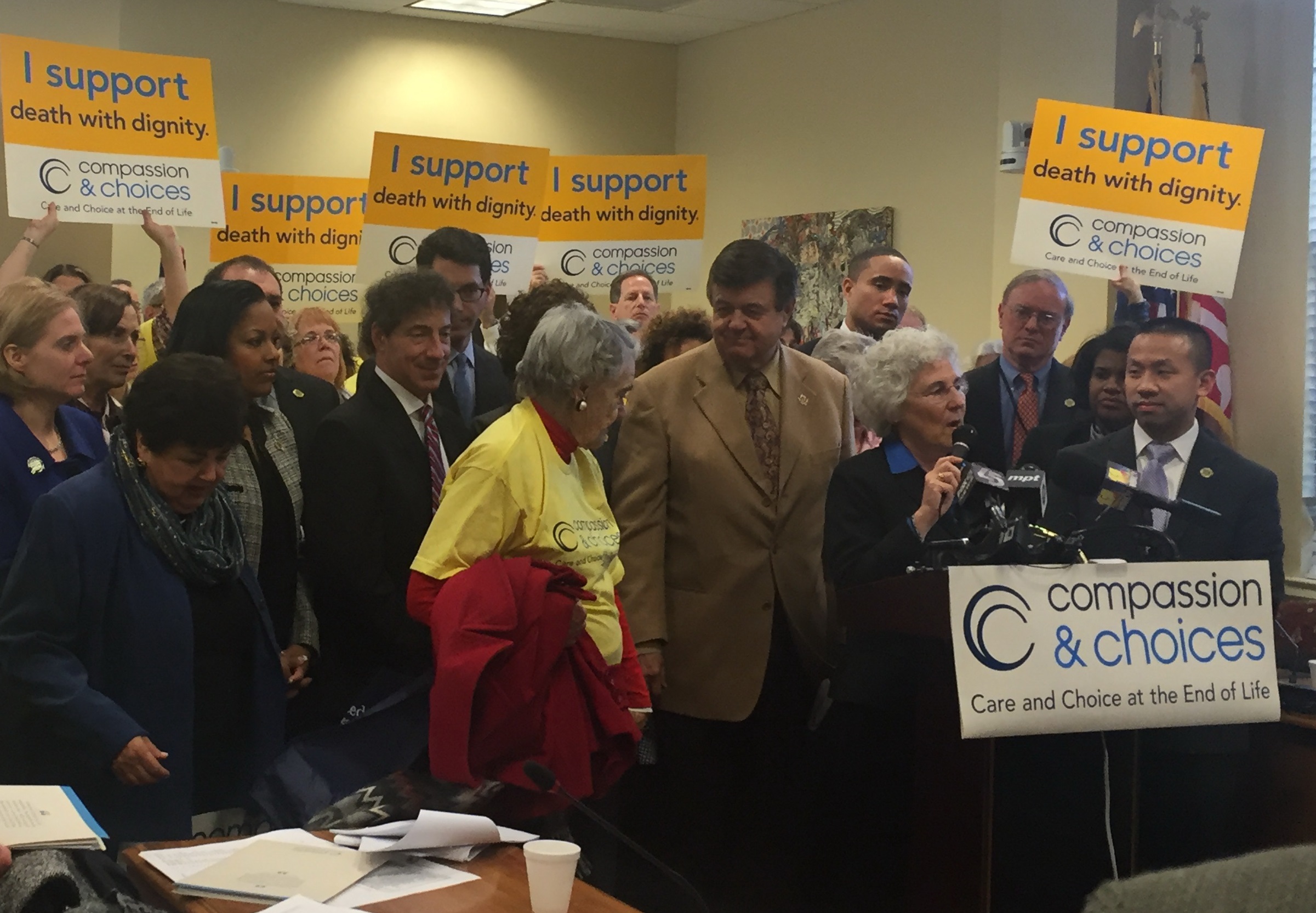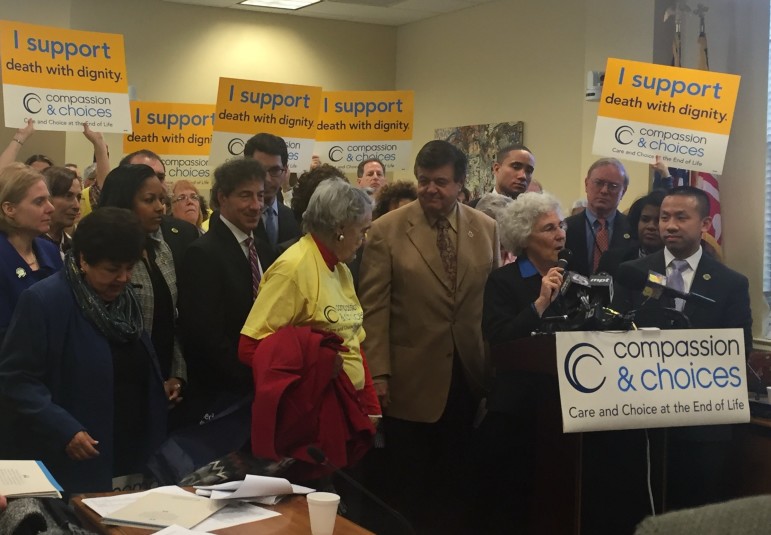By Rachel Bluth
Capital News Service
Amy Chase lost both of her parents to cancer. She herself has survived both thyroid and breast cancer and as she thinks about the end of her life, she says she wants choices.
“I’m not sure I would ever take this option but I want this option available,” Chase, 51, said Thursday, of ending her life. “I think it should be the last choice that you get to make in life.”
Chase is a volunteer with Compassion and Choices, a group that advocates medical aid in dying, sometimes called physician-assisted suicide. Compassion and Choices held a news conference to support upcoming legislation in the Maryland House and Senate that would authorize doctors to prescribe lethal medication to terminally ill patients.
Supporters of the legislation say that choice is the heart of the issue, not death.
The bill failed last year, and sponsors have made changes to improve its chances this year.
About choice
“This bill is not assisted suicide, it is a choice a person makes for themselves,” said Sen. Ron Young, a Democrat from Montgomery who is sponsoring the bill in the Senate.
Not everyone thinks this legislation is only about choice. Delegate Tony McConkey, a Republican from Anne Arundel County, calls it the “kill Granny bill,” and said he thinks it will encourage terminally ill patients to end their lives to avoid being a burden to family and loved ones.
“How is it not about suicide or death? We are condoning it…as soon as we say as a society, ‘Suicide is OK, if you want to escape from your problems, go ahead and kill yourself,’ then it becomes acceptable in other situations,” McConkey said.
Safeguards
Supporters like Kim Callinan, the chief program officer for Compassion and Choices, are quick to point out that the bills contain many safeguards to prevent coercion or abuse.
Adults who are deemed mentally competent and have a terminal illness with only six months to live, must make three requests for a prescription for life-ending medication.
The first request, which is oral, must be done when the individual is alone with the doctor. The second request, which is written, must be witnessed by someone who will not benefit from the death; and the final oral request must occur at least 15 days after the original request and at least 48 hours after the written request.
The person must also be able to take the medication themselves, so no one can administer it without their consent.
“‘Assist’ is not an accurate word, ‘assist’ implies that you are doing it for them,” said Delegate Shane Pendergrass, D-Howard, who is sponsoring the legislation in the Maryland House. She was one of about 10 Democratic lawmakers present at the news conference.
Not suicide, a better death
Kaili Van Waveren, a 32-year-old activist from Frederick, said even the word “suicide” is inaccurate.
“It’s not choosing death over life, it’s choosing the better death when dying is the only option,” Waveren said.
Delegate Chris West, from Baltimore, was the only Republican who came to the news conference in support of the legislation. He said it came down to a matter of choice, that the government shouldn’t tell citizens how they may or may not die.
“You’re going to find some Republicans who support this legislation, and they will be on the Libertarian side of the continuum,” West said.
Alex Vishio, an assistant minister for social justice with the United Church of Christ, said giving people the choice to end their lives is consistent with religious principles.
“At the heart of the universe is a heartbeat of unbounded love that does not like, and is in fact antithetical to, suffering,” Vishio said. “Especially suffering merely for the sake of suffering.”
CNS Correspondent Lexie Schapitl contributed to this report.







I see you all will be reporting on a legalize assisted suicide bill upcoming.
I have found (serving 60 fair booth days) that about half of the public thinks they are in favor of such a law, that is until they learn about the flaws in the laws that create new paths of elder abuse with immunity. Once they learn that a predatory heir may steer the signup process and then forcibly administer the lethal dose without oversight, they all said, “I am not for that!”.
Anyway all of these Oregon Model bills have the same flaws that eviscerate flaunted safe guards.
Here is an example list of flaws posted recently about the New Jersey bill that failed.
The New Jersey Alliance exposed the following flaws in S 382:
No requirement of mental health evaluation or pain relief consultation.
Permits an heir to witness a death request.
Requires no oversight on whether the patient was willing to take the lethal drugs.
No requirement that a medical person be present to supervise the ingestion of lethal drugs.
Allows a third party familiar with how the patient communicates to make the death request.
* Permits lethal drugs to remain in a patient’s home without securing them.
* Relies on the inaccurate premise that a doctor can predict death within six months.
* No distinction as to whether the death prediction is with or without treatment of the patient.
* No required notification of family members.
Immunizes from prosecution anyone participating in administering lethal drugs, even if their participation was coercive and out of self-interest
Falsely certifies the cause of death.
The New Jersey Alliance Against Doctor-Prescribed Suicide is a broadly-based, diverse coalition of organizations strongly opposed to the legalization of assisted suicide.
Use this as a check off list on your bill when it is published. Well worth your time.
At your service,
Bradley Williams
President
MTaas.org
Hamilton, MT 59840 Pa I was born in Baltimore